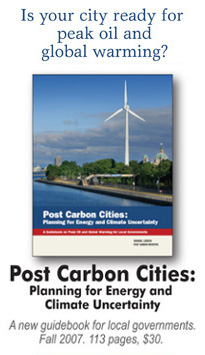

___________________Home_________________

Click image
above for ordering information.
*Author’s note: At its General Assembly, the Unitarian Universalist Association adopted Ethical Eating: Food and Environmental Justice as its congregational study and action issue for the years 2008-2012.
The Tampa bay Post Carbon council makes no recommendations or endorsements of particular philosophies emerging from the diverse and often contentious field of nutritional choices.
However, the energy advantages of localized production of a significant part of human food requirements are an important component of post carbon strategy.
~ Localization in the Tampa Bay Area ~
Sweetwater Organic Community farms
Gateway Organic Farm _ Clearwater


by Wendy Risk*
Several years ago, despite eating a healthy diet, I almost died of malnutrition. I was eventually diagnosed with Celiac Disease, an intolerance to gluten, the protein in wheat, rye, and barley, and to eggs and dairy. I improved on a diet of organic whole foods, including vegetables from a local community organic farm.
I still worried about the quality of my meat due to CAFO’s (concentrated animal feeding operations). Cows are grass eaters, and feeding them grains such as corn and wheat and supplements makes beef farming extremely profitable. However, corn-fed beef is less nutritious and makes us sick. Most of the antibiotics used in the U.S. go into animal feed, leading to autoimmune diseases in cows. Cow manure, once a rich fertilizer, has become toxic waste.
In the short run, beef is cheap. Long-term expenses include antibiotic resistance, farm subsidies, and health problems. CAFO’s scared not only the Union of Concerned Scientists. They scared me. Organic factory farming, an improvement, still pollutes the air, land, and water, stamps out a substantial carbon footprint, and leads to the loss of small family farms.
On a quest to find healthy planet-friendly meat, I sought to build a relationship with a quality food source. An acquaintance recommended Dennis Stoltzfoos, a farmer whose philosophy is to help people regain their health and their families. I liked that. When I called, he invited me to visit.
It was an easy drive up I-75 to Gainesville. From there, I drove about an hour along scenic country roads through old Florida. The last mile or so was dirt two-track bordering a field of grazing cows.
I pulled into the driveway, seeing only a toddler in a pink dress pinning laundry on a child-sized line. This was Caroline. She told me her father was in the field, but her mother was home. She allowed me to pick her up and carry her to the house. On the way, we stopped to see Mimi, a gray tabby, nursing her litter of kittens.
The front door opened, and I met Caroline’s mother, Alicia, and Caroline’s two sisters. Alicia was carrying a laundry basket of wet clothing, newly acquired hand-me-downs. We strung the adult-sized laundry line with pinks and purples and yellows. Alicia then invited me inside where she was simmering a roast and finishing two generous batches of cottage cheese. The house smelled like I had walked into the eighteenth century.
Efficient, intelligent, and energetic, Alicia is every inch a multi-tasking farm wife. Alicia also takes customer orders and home-schools the children.
At lunchtime, lank and lean Dennis ambled in. His family has been farming for generations, and he looks every inch a farmer. The youngest of eleven, Dennis was raised on his parents’ Amish/Mennonite dairy farm in Lancaster, PA.
Over lunch, I learned that Stoltzfoos’s father had been a progressive chemical farmer. Roman, an older brother, had inherited the family farm, trading in chemical farming for Big Agra organic. Stoltzfoos rejects both methods. Part of the Local Food Movement, Stoltzfoos sells his organic produce directly to customers like me. His small farm is responsible, sustainable, diverse, and connected to the community. He believes in ethical farming.
We sat down to lunch: their own kefir, a fermented milk, and bologna. The Stoltzfoos bologna contains no unpronounceable chemicals, simply beef, salt, and a touch of unrefined cane sugar.
“This is the best bologna I’ve ever tasted,” I complimented.
“Our goal is to produce the most nutrient-dense foods possible,” Dennis said. “We spare no expense to pack the most nutrients into a mouth full of food.”
I watched Lilly, 6; Caroline, 3; and Stella, 2 drink their raw milk kefir. I used to love it, but I could no longer do dairy.
Over half the planet still drinks its milk raw. U.S. experts are divided. Some think it’s questionable. Others call it a super food, full of healthy proteins and fats and beneficial bacteria, enzymes, and hormones that pasteurization kills. Stoltzfoos’s customers pay top dollar for nutrient-dense raw milk, the cream of the cream.
Stoltzfoos hasn’t always been a farmer on a mission to help people regain their health and their families. At age twenty, he left the family farm for something better. In early adulthood, he suffered allergies, chemical sensitivities, and possible Celiac Disease, symptoms similar to mine. He eventually laid out $500—a handsome sum then—for medical tests, only to have the doctor conclude nothing was physically wrong. In fact, the doctor referred Dennis to a psychologist. Stoltzfoos didn’t go.
“I thought if that educated idiot can’t help me, I would have to help myself.” Stoltzfoos read, ate a vegetarian diet, entered the health care field, and still felt terrible. Then Stoltzfoos tried a traditional diet of organic whole foods: grass fed beef, healthy fats, fermented food, and fruits and vegetables. This diet restored his health.
Stoltzfoos was tinkering with returning to farming when he met Alicia at a friend’s dinner party. “It wasn’t an instant click,” Dennis said. Raised in Tampa, Alicia was too young and too liberal for Dennis’s tastes. “I didn’t think there was much of a chance here.” He smiled, remembering.
On their second date, he asked her a million questions. “I wasn’t interested in playing games,” said Dennis, who was then in his mid-thirties.
“I was very intrigued by him,” Alicia said. “He was good looking, and he was genuine.”
Three months later, Stoltzfoos concluded, “Opposites attract.” When he proposed, Alicia accepted. After the marriage, they contemplated returning to farming. “I didn’t want to do it unless I could do it right,” he said.
That meant farming organically, ethically, and sustainably. Stoltzfoos wanted no part of conventional farming, which consumes 17% of the nation’s energy, and bills the taxpayer for transportation. He didn’t want to use pesticides, ineffective and detrimental to the environment. He wanted to enrich the land, to bequeath as a gift to future generations. To him, it was common sense.
Stoltzfoos researched the science of grass-fed beef, which requires healthy soil and careful pasture management. He knew that grass-fed beef reduce greenhouse gases, global warming, and topsoil erosion. He understood that grass-fed beef promotes native plants, biodiversity, and soil fertility.
They leased a farm in Dade City and did well. “Everything we produced was just gone.” They looked for a place to buy. After a year, they found sixty acres that had been organic pasture for a decade, except for a few spot sprayings.
The farm has taken off. They now gross $200,000 a year, and Dennis dreams of expanding his operations into a franchise. Alicia is not so ambitious. “My dream is to be not as busy,” she said.
Carbon footprint in mind, Stoltzfoos walks to his chores, sometimes ten miles a day. “And that’s never a step empty handed,” he adds. Often, he has a daughter on his shoulders. “It’s a long walk for little legs.” He did without a tractor for a year. “The hay guys made it and left it for the cows. (right)
He moves his cows and eggmobile to young grass daily, providing fresh shoots for the cows, fresh bugs and worms for the chicken, and fresh fertilizer for the pasture. Nothing in wasted. “The high quality green grass that grows behind the eggmobiles is phenomenal,” Stoltzfoos says. His egg layers are gorgeous free-range Rhode Island reds.
Stoltzfoos’s grass-fed Jerseys give only a gallon or two of nutrient-dense milk a day, less than the 5-10 gallons factory cows produce. That’s why his milk costs more.
In the South, the wild pig, a pest, accounts for $50 million annually in crop loss. Local hunters kill hundreds every year and plow them under. “They throw them away!” Stoltzfoos is indignant. He understands that acorns and wild roots make nutrient-dense meat. But is it tasty? He asked the hunters for a sample. “It is incredible,” he said. Now he purchases wild pig from the hunters, pays his butcher to process it, and makes a small profit, to boot. Wild pig adds to the community’s economy. “It’s a sweet deal,” Stoltzfoos said.
On the way to visit the butchers, we stopped at the Luraville Country Store, a picturesque gas station with the original, now inoperative 1930 hand pumps. Inside, I scanned the shelves, finding only the ubiquitous junk food available at any Interstate quick stop.
“Do you carry anything local?” I asked.
“What do you mean?” the clerk asked.
I told Stoltzfoos it was a pity that no one in the hamlet was interested in organic, and that this independently-owned shop offered the same products as chain stores.
Stoltzfoos nodded. “I’m not friendly to Walmart. They don’t believe in workers’ health, and they don’t believe in fair trade.”
At dinner, I ate the delicious pot roast on faith. “Grain fed beef are fed wheat. That’s gluten,” Stoltzfoos theorized. “You’ll do better on grass fed.” Could corn and wheat in the cows’ diet explain my problem digesting beef? They did. I have no problems with grass fed beef.
At sunrise the next morning, I help Stoltzfoos milk cows. He brought them in from the field and introduced them by name. Then he wiped their udders to stimulate their let down reflex and milked. My job was to bottle milk and shoo off cats.
Breakfast was eggs, kefir, and wild pig sausage. The sausage was terrific, made with only lean wild pig, salt, and unrefined cane sugar. Like Stoltzfoos, I have a high metabolism and tend to hypoglycemia. I noted how few carbohydrates he ate, and I vowed to eat fewer myself.
A hard frost had killed the Stoltzfoos’s peach crop. A neighbor who had saved his invited us over to pick. Farmers are like that. We came home with a couple of bushels, and we began paring peaches for ice cream.
A neighbor stopped by. New to organic farming, he had lost half his Cornish Cross hens to heat stroke. Stoltzfoos went out to commiserate and to mentor. Farmers are like that. The neighbor had moved from New York to start a 55 plus campground. When that didn’t fly, he turned to organic farming. “Their property is very interesting,” Alicia said.
A leader among regional farmers, Stoltzfoos hosts seminars and get-togethers with national speakers. The next big event will be a shindig at the farm on September 20. The speakers are Greg Judy, author of No Risk Ranching and holistic veterinarian Dr. Will Winter. There’s sure to be grass-fed beef, free-range chickens, wild pig sausage, and homemade ice cream.
One night on the farm, after dinner and chores, the family gathered to jump on the trampoline: Mom, Dad, Lily, Caroline, and even Stella. It was a joy to watch.
I respect this farmer. He is living his mission of helping people regain their lives and their families. By investing in his land, eating with his family, and spending quality time with them, Stoltzfoos is the change he wants to see in the world.
My quest was accomplished. I had found a source for quality meat. I drove home with full coolers and the knowledge that this was the beginning of a beautiful friendship.
For more information:
To learn about organic grass-fed beef, check out eatwild.com
To contact Stoltzfoos, email: thisisdennis@juno.com
For more information, contact
Tampa Bay Post Carbon Council
6814 Charlotte Harbor Way,
Tampa, Florida 33625-3765
Or, E-mail us Here.
